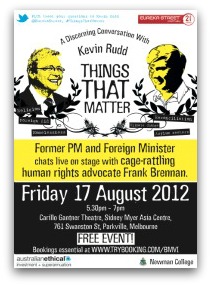
The word ‘forgettery’ was mentioned several times by Kevin Rudd during the Eureka Street Discerning Conversation at Melbourne University earlier this month.
It’s not listed in the Oxford or Macquarie dictionaries, possibly because it originated in the Rudd household and may not have gone far beyond. Rudd said: ‘Mum always had a saying: just put it into your forgettery’.
He used the term to indicate what he does with criticism he’s been subjected to over the years, such as that referring to his reported tantrums and harsh treatment of staff.
Is putting unpleasant or shameful memories out of our mind a sign of arrogance, or instead the outcome of a proper discerning of what needs to be taken seriously?
There are some clues in an interview which Annabel Crabbe conducted with his wife Therese Rein for Fairfax in 2009. They suggest it was apt to use it during an event that was titled Things That Matter.
In dealing with her anger over the publication of photos of her gym workout, Rein said she put it into the forgettery. It’s the same for opposition and media outrage over the Rudd Family's use of a publicly funded maid to babysit their youngest teenager during their early days at the Lodge in 2008. The forgettery is for the things that don’t matter.
‘All that stuff goes straight to the Forgettery,’ Rein told Crabbe. ‘Stuff that actually doesn't matter goes in there. Stuff that's not important, stuff that if you carried it with you would be a burden.’
On the other hand, some things do matter, and we need to carry them with us until we can atone for them. These may or may not include items in Rudd’s forgettery. But they certainly included the treatment of Indigenous Australians, and also the Forgotten Australians mistreated in institutional child care last century, and children sexually abused by church officials.
The media and opposition are programmed to act as watchdogs. They – and indeed the public – will not allow things that matter to remain in the forgettery. Former prime minister John Howard put the treatment of Indigenous Australians into his forgettery. Subsequent support for the Apology showed this to be a misjudgment of public sentiment.
As for the church, Bishop Anthony Fisher appears to have had the forgettery in mind when he provoked outrage during World Youth Day 2008 by trying to insist a sexual abuse case belonged there. Before later apologising, he spoke disparagingly of those who were ‘dwelling crankily ... on old wounds’.
This raises the question of the motivation for keeping some things in the forgettery while allowing others to be retrieved from it. The identification of the truth in a way that leads to the righting of the wrongs of the past would seem appropriate justification. But too often, it is done as an act of political or psychological vindictiveness.
Julia Gillard has had her own forgettery raided during the past week with media coverage and opposition questions concerning events that occurred two decades ago at the end of her period of employment as a lawyer with Slater & Gordon.
At her media conference on Thursday, she lashed out at the ‘misogynists and the nut jobs on the internet’, which would seem to be fair criticism. As would criticising The Australian newspaper for using already resolved issues from the past to prosecute its anti-Labor political agenda.
A forgettery is not sealed like the confessional, but it should not be opened unless it promotes justice for the individual and the common good.
 Michael Mullins is editor of Eureka Street.
Michael Mullins is editor of Eureka Street.